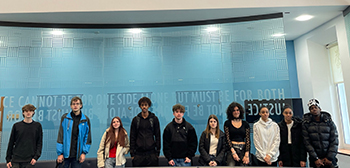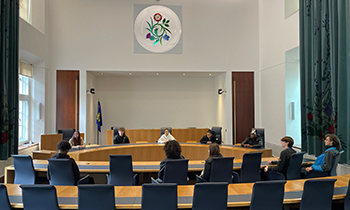 A-Level Politics students at Richmond upon Thames College (RuTC) visited the Supreme Court, in Parliament Square in mid-April, as part of their coursework.
A-Level Politics students at Richmond upon Thames College (RuTC) visited the Supreme Court, in Parliament Square in mid-April, as part of their coursework.
Student, Antriana Sampo, recounted the trip:
“The Supreme Court opened in 2009, after the Constitutional Reform Act (2005) and is the final court of appeal in the UK, which hears cases of the greater public or constitutional importance affecting the whole population.
 Our trip began by being shown Court Room 2, where we first established the key differences between the features of a regular court and the Supreme Court, which consisted of cameras, no witness stands and the judges table being the same height as the defendant’s table. We also learnt that the Supreme Court only enforces and states what the law is and does not provide judgements of guilt. The emblem of the Supreme Court was also explained to us, and we learnt that it consists of the different national flowers of all the countries in the UK (the Tudor rose for England, the thistle for Scotland, the leak leaves for Wales and the flax blossom for Northern Ireland), to represent unity. It also consists of the Greek letter Omega, which symbolises finality.
Our trip began by being shown Court Room 2, where we first established the key differences between the features of a regular court and the Supreme Court, which consisted of cameras, no witness stands and the judges table being the same height as the defendant’s table. We also learnt that the Supreme Court only enforces and states what the law is and does not provide judgements of guilt. The emblem of the Supreme Court was also explained to us, and we learnt that it consists of the different national flowers of all the countries in the UK (the Tudor rose for England, the thistle for Scotland, the leak leaves for Wales and the flax blossom for Northern Ireland), to represent unity. It also consists of the Greek letter Omega, which symbolises finality.
 We then had the opportunity to look at a court case, named ‘Isle of Wight vs Platt,’ which involved a father taking their child to Disney Land during the school term and was fined £50 by the council for his, which he thought unfair and took to court. We discussed within our group whether the father was justified in the decision, or whether the council was right to fine him. This included investigating details of UK laws and acts, to consider who was lawfully right in the matter, and concluded that the council won the case.
We then had the opportunity to look at a court case, named ‘Isle of Wight vs Platt,’ which involved a father taking their child to Disney Land during the school term and was fined £50 by the council for his, which he thought unfair and took to court. We discussed within our group whether the father was justified in the decision, or whether the council was right to fine him. This included investigating details of UK laws and acts, to consider who was lawfully right in the matter, and concluded that the council won the case.
To end the day, we got the chance to sit in on an actual court hearing (Abbasi and another (Respondents) v Newcastle upon Tyne Hospitals NHS Foundation Trust (Appellant), which was a case about releasing information on doctors who were involved in the withdrawing of treatment of a patient.”
It was a truly insightful visit for our learners, who were able to put their studies to use in real-life situations and practice analytical thinking.
Find out more about our courses and how to apply for 2024 here.
